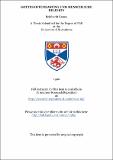Files in this item
Gottes Offenbarung und menschliche Religion
Item metadata
| dc.contributor.advisor | Shaw, D.V.D. | |
| dc.contributor.author | Reinhardt, Krauss | |
| dc.coverage.spatial | xvii, 359 p. | en_US |
| dc.date.accessioned | 2018-06-08T13:04:26Z | |
| dc.date.available | 2018-06-08T13:04:26Z | |
| dc.date.issued | 1990-07 | |
| dc.identifier.uri | https://hdl.handle.net/10023/13851 | |
| dc.description.abstract | In polemical response to the approach represented by Friedrich Schleiermacher, Karl Barth proposes to evaluate religion strictly from the perspective of God's revelation. In spite of this radical departure from Neo-Protestant epistemology, Barth continues to understand religion in Schleiermacher's terms, namely as an essentially anthropological category. The reductionist tendencies inherent in this understanding of religion cause Barth to lapse into his early 'dialectical' concept of revelation with its strong emphasis on the divine transcendence. This, in turn, leads to a radical polarization of revelation and religion which finds expression in Barth's call for and development of a theological criticism of religion. At its core this theological criticism of religion is thus not a new understanding of religion, but rather an assessment of Schleiermacher's view of religion within the framework of Barth's early 'dialectical' theology. The absolute dichotomy between revelation and religion resulting from this approach stands in direct conflict, however, with Barth's affirmation of a positive relationship between these two categories. His attempt, under the term 'true religion', to further develop such a positive correlation between revelation and religion without substantially modifying the meaning of both these terms is consequently flawed with a series of logical contradictions and results in a highly questionable Christian exclusivism. An alternative theological approach to the problem of religion based on christological considerations is found as an undercurrent in Barth's thinking. This christocentric view of religion, although not yet sufficiently developed by Barth himself, is in better agreement with his mature theology than is his 'dialectical' approach. In addition, this alternative proves to be theologically more promising with respect to its logical consistency, its biblical foundation, as well as its importance for the current debate over a viable Christian 'theology of religions'. | en_US |
| dc.language.iso | en | en_US |
| dc.publisher | University of St Andrews | |
| dc.subject.lcc | BT78.B3K8 | en |
| dc.subject.lcsh | Revelation--Christianity | en |
| dc.title | Gottes Offenbarung und menschliche Religion | en_US |
| dc.type | Thesis | en_US |
| dc.type.qualificationlevel | Doctoral | en_US |
| dc.type.qualificationname | PhD Doctor of Philosophy | en_US |
| dc.publisher.institution | The University of St Andrews | en_US |
This item appears in the following Collection(s)
Items in the St Andrews Research Repository are protected by copyright, with all rights reserved, unless otherwise indicated.

